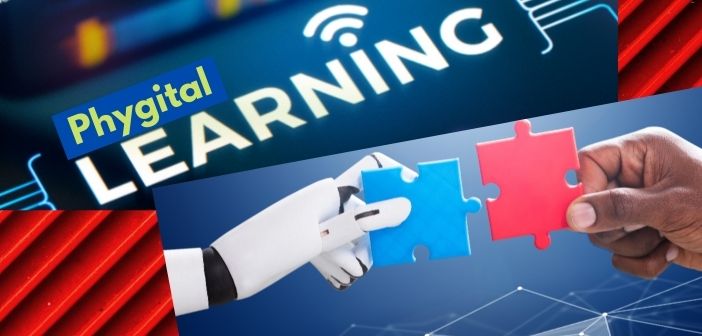Guest Author: Chiranjiv Guha, Partnerships Lead, TCS iON, Tata Consultancy Services

Till recently, it was almost impossible to imagine that practical training for skill-based vocational courses could be delivered online, so effectively! Thanks to the push from COVID-19, the impetus to adopt digital technology in combination with traditional training methods has helped us re-imagine skilling in many new ways.
It was not just the pandemic that made us rethink the way skill training was imparted, the new National Education Policy (NEP) 2020 also calls upon accelerating skill-based training through “blended learning” or in a “phygital mode”. Phygital learning, in simple words, is the amalgamation of physical and digital environments or platforms of learning.
‘Phygital’ learning is an innovative learning approach that combines digital learning with hands-on learning and instructor-led interventions to provide a unique, engaging, and inclusive learning experience for learners.
However, finding the right blend of appropriate and quality content as per National Skill Qualification Framework (NSQF) levels, with scope for rigorous hands-on training along with reliable testing and assessments, together, is a challenge. Achieving this with speed, scale and sustainability in vocational and skill development space, is something that needs conscious and continuous efforts. The solution to this challenge lies in a phygital model.
Phygital model in skill development can be a potential game-changer in reimagining vocational education making it more accessible, affordable and aspirational. Here’s why:
- The new-age phygital learning and assessment solutions help in addressing some of the challenges in the present models.
- An increasing number of training providers, technical training institutions, State governments, academic institutions and others in the ecosystem are adopting phygital model to deliver skill courses.
Let us explore the top five reasons why training partners and skills enablers need to adopt phygital model in skill development.
“The institutions offering training programs in conventional brick-and-mortar model are gradually adopting interactive classroom training, leveraging technology (like – video conferencing tools, e-learning solutions, robust LMS etc.). The phygital model of TCS iON is going to take care of skilling in both manufacturing and service sectors by nurturing and enhancement of psychomotor skills, essential across all domains.
The new dawn of the decade brings loads of opportunities for exploring, executing, and experiencing new approaches, leading to new-age learning of knowledge, skills, and process abilities. The holistic growth of every individual commences from personal and professional experiences of the mind and the intellect”, Sudhakar Gudipati, Business Unit Head – Vocational Education, TCS iON, Tata Consultancy Services

1. Affordable, accessible, scalable learning in a secure environment
Leveraging technology, we are able to take the learning environments beyond the four walls of classrooms. Along with enhanced accessibility, affordability has also been increased among learners – enabling anytime-anywhere learning.
For institutions, phygital model has been a blessing which is enabling them to scale beyond their campus by delivering the same high-quality training, benefitting a greater number of eligible aspirants.
TCS iON plays a critical role in building ecosystem partnerships with all key stakeholders in the skill development space. This is achieved by disseminating the best industry-relevant learning, leveraging key strengths of the partners, combined with its robust, secured and trusted digital platform.
2. Quality content with standardized delivery through phygital model
Phygital model of training and content delivery promises standardized training delivery to the students, through quality content. The content is delivered on a digital platform in the form of live lectures and digital self-learning resources along with efficient academia and industry connect. At the same time, the hands-on sessions for practical training happen at the last mile training centres and/or leverage the digital platform capabilities.
These are complemented with digitized study guides, remote proctored or internet-based assessments, live interactive sessions with industry leaders, etc. This enables learners to access the training content, active participation in expert sessions in a seamless manner, ensure standardized knowledge dissemination, making the learning holistic in nature.
3. Personalized skill training
Through phygital model, students can have access to personalized learning driven by interest and aptitude, enabled by adaptive learning mechanisms. The innovative flexible pedagogical structures in phygital mode are developed to suit the needs of varied learner profiles, breaking geographical and demographic barriers. This enables learners to acquire appropriate and industry-relevant skillsets, with flexible learning hours.
Further, this model provides learners, access to practice assessments with personalized real-time reports and analytics for self-evaluation and continuous skills competency check, highlighting the scope for improvement. This motivates continuous upskilling, reflecting industry needs.
4. Workplace readiness of students
Training in a phygital model helps learners to develop the domain skills and also nurtures digital skills. Therefore, through a phygital model, inclusive of workplace experience, vocational competence and critical employability skills, positively influence the readiness of the learners’ professional careers.
This model also ensures that today’s learners are well exposed to various learning media and better prepared for their tomorrow’s careers. The TCS NQT (National Qualifier Test), drives dual democratization of skills and jobs, capturing all these abilities of learners and reflecting the same to potential employers
5. Holistic learning environment to achieve desired outcomes
Phygital learning takes an end-to-end approach. From learning by accessing standardized digital content with additional reference learning materials to getting trained through hands-on practice sessions; from engaging with instructors, subject matter experts from industries and peers, to accessing different assessments, certification and job opportunities, etc. The holistic learning environment integrated with a network of last-mile connect of institutions, offering hands-on exposure enriches the learning experience.
The outcomes of phygital learning model are improved engagement in capturing the interest of learners and motivating them to continue learning in both aspects, industry and academia. TCS iON has been partnering with renowned academic institutions (viz. higher education institutions or skill training institutions), industry leaders and content development players, to take the best-in-class learning to every district through its last-mile learning practice and assessment centres, making it accessible to every youth of the country.
Simultaneously, this model is also helping the institutes to generate an additional revenue stream leveraging their existing expertise and infrastructure and enhancing their capacities continuously, leading to more sustainable operations.
TCS iON will be glad to onboard institutions, that aspire to join the journey in making phygital learning available, accessible and successful with scale!
Click here to know more about programs offered by TCS iON in technical and vocational education – https://learning.tcsionhub.in/hub/ve/
For more information about TCS iON phygital model for vocational education, please email at tcsion.ve@tcs.com














